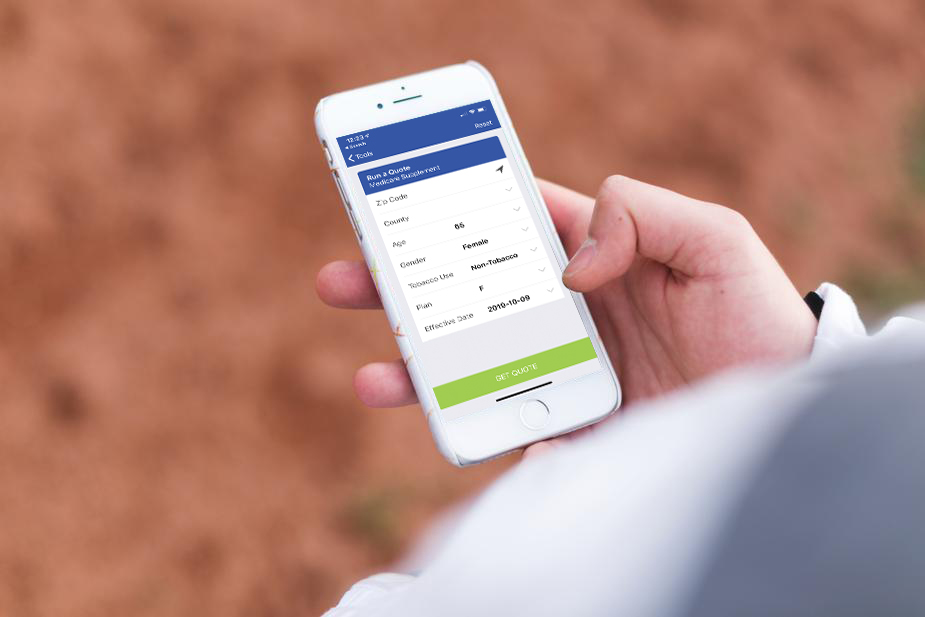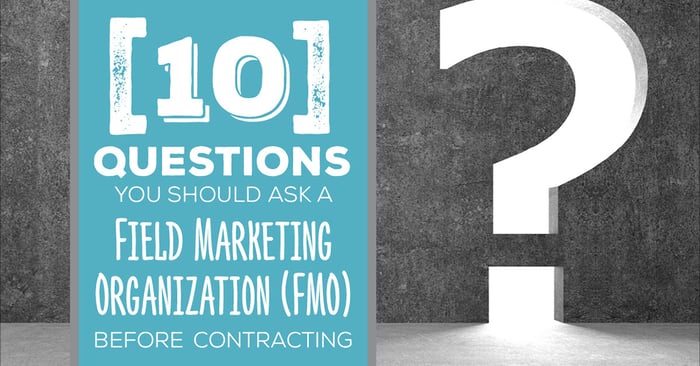All insurance agents will need to find a good FMO at some point, but looking around on Google and spying on the insurance forums will only get you so far.
So, if you’re searching for a new upline and want to be sure you make the right choice the first time around, we’ve got a few pointers along with 10 questions you should consider asking that FMO before you get appointed.
Look Around the Website
For starters – and you probably already have this one down – you want to take a look around the website.
A good FMO will have a website that’s up-to-date and easy to use. In general, you’ll find product and carrier information, contracting and quoting information, and staff information.
But perhaps one of the best ways to get a first impression of an FMO is to spy on their blog. A great FMO invests in helpful content for their agents, and they keep it consistent and up-to-date.
If the last article the FMO put out was a year ago, that tells you they aren’t consistent. Sure, one could argue that the blog isn’t quite as helpful as back office support, but if the blog is out of date, that’s often a sign that things aren’t that organized elsewhere.
So, before you do anything, consider subscribing to the FMOs blog or newsletter.
This gives you some time to see how often they update their content and how well they communicate with the agent.
Start a Conversation With the Staff
The next step is to start up a conversation with the FMO's staff. The least committal way to do this is to start up an online chat if that’s available. This gives you a chance to get a feel for the FMO without digging your feet in too deeply.
However, you’re more likely to get an honest feel for the company by talking with someone on the phone. If the FMO is in your area, consider scheduling a day and time when you can meet the staff.
If you’re not sure what kinds of questions to ask – and what answers would be ideal – we’ve come up with 10 questions for you.
Don’t hesitate to interview the FMO you’ve been looking at. It’s much better to get these answers upfront, especially before you sign any contracts and are potentially tied to that FMO for a while.
1) What type of insurances do you specialize in?
It’s always good to confirm that the FMO you’re interested in specializes in your niche. If you sell life insurance, you want to make sure you’ll have good support on that area. The same goes for any other type of insurance.
One way to make sure the FMO has good staff support in that area is to take a look at the staff page. Is there a staff member completely dedicated to that product line? For example, on our website, you can see that Kirk Sarff is the Director of Life Insurance Sales. You’ll also see that Steve Spinner is the Director of Medicare Advantage Sales.

This lets you know that you’ll have full support for that product. You’ll have a dedicated staff member to go to when you have questions and need help.
Another question to ask is which product supports the bulk of the FMO’s business. For us, that’s Medicare Supplements. If that’s the product you also do the most business with, it’s more likely that the FMO will be a great match.
2) Do you have a quote engine?
For the most part, every FMO is going to have a quote engine you can access, but it’s still a good question to ask.
You can even ask if you can test it out to get a feel for the ease of use and any nice features that’ll help you down the road.

For us, we offer a free trial to new agents so that they can test it out before ever contracting with us. Our quote engine also has some nice features that’ll come in handy like:
- Comparing quotes
- Packing multiple products together
- Access to market analytics like rate increase histories
- Underwriting filters to knock out carriers that don’t accept certain health conditions
- Medicare Advantage + Hospital Indemnity pairing to easily show a client how it “fills in the gaps”
- Free mobile app for iPhone and Android
You might consider looking for features like these because they’ll ultimately make selling a lot easier, which means better service for your clients and a better bottom line for yourself.
3) What kind of customer service do you offer the agent?
This is really important to ask because every company out there – no matter what industry – is going to tell you they have great customer service. But honestly, what does that even mean?
Find out specifics.
At New Horizons, customer service means making your job easier so that you can sell more in less time. Where we feel we stand out is helping the agent place business. John Hockaday really shines in this area, because nobody – and we do mean nobody – knows underwriting better than him. He knows what underwriters will take and what they won’t, which ends up saving you a lot of wasted time and heartache.

Sure, fast contracting and communication is important, and we hope every FMO excels in that area, but what you really want to keep an eye out for is assistance in getting the sale and knowing where to put it. Customer service goes so much further than just paperwork, so don’t settle for anything less.
4) What is your policy on releases?
This is a very popular question from agents, and it’s tough to tackle as an FMO. But we’re transparent and always have been, and our relationship with the agent will always take priority.
When it comes to releases, you have to consider both sides – the agent and the FMO. On one hand, the FMO has likely spent a lot of time, money, and effort in order to earn your business. But on the other hand, if the agent has been wronged, and you don’t want to do business with the FMO anymore, you shouldn’t be stuck.
Here’s some advice from John Hockaday:
“If you’re new to the business and aren’t sure who to do business with, appoint with multiple FMOs. We have a lot of agents that work with multiple FMOs, and if I was in their shoes, I probably would to! After 6 months or so, narrow it down and decide who has been meeting your needs and who you can trust. I’d rather an agent do that then appoint with 15 carriers and then want to leave.
If you’re building a house, you’d shop around and find a few different contractors before marrying one. I’d suggest doing the same thing when it comes to finding an FMO.”
5) Do you offer any training?
While many experienced agents aren’t interested in training, we know this is important to those who are new in the business or want to delve into new product lines.
Whether you’re interested in training right now or not, it’s still a good idea to bring this up. You never know if you’ll want to get into a new product down the road, and having that extra support will come in handy.
Related: Check Out Our Webinar Calendar and Webinar Recordings
Find out what the company’s history is in this area: have they done any training seminars in the past? If they have, how many have they done and what were they teaching?
Do they offer any online resources for you? Are you welcome to call in with questions as they come up? Do they host webinars?
At New Horizons, we’ve done many in-person training seminars, with the most recent one being a Fixed Indexed Annuities training at our office in Decatur, IL.
We also do webinars throughout the year on a variety of subjects.
[RELATED: Webinar Recording: How to Retire as an Independent Insurance Agent]
6) What is the commission structure?
You obviously need to consider how good the contracts are. This is a business, after all! You’ll need to get on the phone in order to get this information since it can’t be published online.
We offer top contracts at New Horizons, but you should still find out what yours would be.
7) How do you communicate with your agents?
If you’re writing business for your FMO, the last thing you want to hear is crickets. Find out how the FMO plans on communicating with you and how often to expect that communication.
With us, we communicate in a ton of different ways:
- Text announcements
- Email newsletters (once a week)
- Phone calls
- Social media updates
You want to hear from your FMO, so make sure you’re getting the attention you deserve.
8) Do you offer a lead program?
Lead programs are controversial – and for good reason. Everybody wants “good” leads, but here’s what usually ends up happening.
The FMO takes a small percentage of your potential commission away to help pay for a lead program. Then, you get leads from a lead company, and they’re either decent or awful.
If the leads are awful, the FMO usually gets the backlash, not the lead company.
So, even if an FMO has this awesome-sounding lead program, take it with a grain of salt.
Even so, it’s still a good idea to ask what kind of lead program there is. Get all of the information – including the fine print! Sometimes, companies will have this amazing-sounding offer like free leads, but when you read the fine print, the leads are really only free for the first two weeks or something of that nature.
We do things a little differently. We’d rather pay you every bit of commission we can pay you, and then you can choose which lead source you’d like to work with. We can certainly steer you in the right direction when it comes to buying leads, but we’ve opted to give the agent top commissions as well the ability to pick and choose.
And if you don’t need leads, you don’t have to sacrifice any of your comp for a lead program that you’re not even going to use.
That said, we do offer LeadCENTER, which is a platform where you can purchase high-quality leads at an affordable price.
9) What’s the background of the FMO owners?
Definitely find out what kind of track record the FMO you’re looking at has. If they’re completely new to the insurance business, why would you trust your business with them?
Find out how many years they’ve been in the business, and better yet, find out what kinds of positions the owners have held.
A person’s background in insurance can make a big difference when it comes to the quality of service you get.
If a restaurant owner first started out as a busboy, then became a waiter, then a bartender, a store manager, and eventually the owner, you can probably tell how their point of view would be much better than an outsider’s would.
That restaurant owner would be able to give advice to the busboy, they’d have tips on how to get better tips for the servers, they’d know that one-off cocktail recipe the bartender’s never seen before… you get the idea.
The same goes for FMO owners. If the owners first started out as an agent in the field, you can see where that expertise would come in handy.
The owners of New Horizons had to pave their way and make a living on commission sales just like you, and they’ve worked their way to being agency owners and now FMO owners.
The moral of the story is, find out the background of the FMO to make sure you’re going to get the best service possible.
10) What makes you different from every other FMO out there?
At this point, you’ve hopefully heard some points that differentiate the FMO you’re looking at from the others. But still – pose this question to see what kind of answer you get.
If you get stock answers like: “We help you grow your business, our success is your success, we’re here when you need us, we have competitive commissions…” then there’s not really anything that makes that FMO stand out.
It’s honestly hard in this industry to be different, and if you can’t seem to choose between FMOs, then test a couple out!
There’s no shame in doing a contract with a few FMOs, seeing how they handle your relationship, and choosing your favorite to do the rest of your contracting with.
If you have any questions for us, please leave them in the comments below or start up a chat using the chat bubble at the bottom of your screen.
You may also like:









